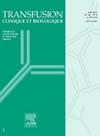Serological profiling and molecular characterization of D variants in Chengdu blood donors
IF 1.2
4区 医学
Q4 HEMATOLOGY
引用次数: 0
Abstract
Background
Some D variant individuals are at risk of developing anti-D immunization when exposed to RhD-positive red cells. Therefore, accurate typing of D variants is essential to ensure the safety of clinical blood transfusion practices. The aim of this study was to investigate the serological profiles and molecular characteristics of D variants among Chengdu blood donors and to establish a more cost-effective RHD genotyping strategy tailored for the Chinese population.
Methods
During the period from 2019 to 2022, samples from Chengdu blood donors typed as RhD-negative with IgM anti-D using the microplate method underwent additional RhD typing with a panel of monoclonal anti-D reagents using both the micro-column gel card technique and the saline tube method. Samples that could not be classified as either RhD-positive or RhD-negative were genotyped using the PCR-SSP assay and Sanger sequencing. RHD zygosity status was determined by assessing the presence or absence of hybrid Rhesus boxes. Alloantibody screening was conducted to evaluate the risk of anti-D immunization.
Results
Three variants RHD*15, RHD*DEL1, and RHD*06.03.01 accounted for 61% of D variants identified in our study. Each of these were studied for distinct reaction patterns with a panel of anti-Ds. Additionally, eight previously reported D variant alleles, including RHD*01W.95, RHD*01W.72, RHD*01W.12, RHD*01W.18, RHD*01W.39, RHD*01W.67, RHD*01W.71, and RHD*01W.960A were observed sporadically. Furthermore, two novel alleles characterized by a nucleotide change (c.283G>T) and a nucleotide change (c.84C>G) respectively were identified. No cases of anti-D formation were detected in the D variant samples.
Conclusions
The spectrum of D variants identified in this study highlights the genetic diversity in the Chengdu blood donors, underscoring the need to incorporate these D variants into RHD genotyping strategy tailored specifically for the Chinese population. Comprehensive analysis of serological reaction patterns across these D variants would help guide molecular testing strategies and enhance genotyping cost-efficiency.
成都献血者D型变异的血清学分析和分子特征分析。
背景:一些D变异个体暴露于rhd阳性红细胞时有发生抗D免疫的危险。因此,准确的D变异分型对于确保临床输血操作的安全性至关重要。本研究的目的是调查成都献血者中D变异的血清学特征和分子特征,并建立适合中国人群的更具成本效益的RHD基因分型策略。方法:2019 - 2022年,对成都市献血者IgM抗- d抗体阳性者,采用微柱凝胶卡法和生理盐水管法分别用单克隆抗- d试剂进行RhD阴性分型。使用PCR-SSP测定和Sanger测序对无法分类为rhd阳性或rhd阴性的样本进行基因分型。RHD合子状态是通过评估是否存在杂交恒河猴盒子来确定的。进行同种异体抗体筛选,评估抗d免疫的风险。结果:RHD*15、RHD*DEL1和RHD*06.03.01三个变异占我们研究中发现的D变异的61%。每一种都用一组抗- d研究了不同的反应模式。此外,包括RHD*01W在内的8个先前报道的D变异等位基因。95年,RHD * 01 w。72年,RHD * 01 w。12日,RHD * 01 w。18日,RHD * 01 w。39岁的RHD * 01 w。67年,RHD * 01 w。71, RHD*01W。偶见960A。此外,还鉴定出两个新的等位基因,其特征分别为核苷酸变化(c.283G>T)和核苷酸变化(c.84C>G)。在D变异样本中未检测到anti-D的形成。结论:本研究中发现的D变异谱突出了成都献血者的遗传多样性,强调了将这些D变异纳入专门针对中国人群的RHD基因分型策略的必要性。综合分析这些D变异的血清学反应模式将有助于指导分子检测策略并提高基因分型的成本效益。
本文章由计算机程序翻译,如有差异,请以英文原文为准。
求助全文
约1分钟内获得全文
求助全文
来源期刊
CiteScore
2.50
自引率
11.80%
发文量
234
审稿时长
36 days
期刊介绍:
Transfusion Clinique et Biologique, the official journal of the French Society of Blood Transfusion (SFTS):
- an aid to training, at a European level
- the only French journal indexed in the hematology and immunology sections of Current Contents
Transfusion Clinique et Biologique spans fundamental research and everyday practice, with articles coming from both sides. Articles, reviews, case reports, letters to the editor and editorials are published in 4 editions a year, in French or in English, covering all scientific and medical aspects of transfusion: immunology, hematology, infectious diseases, genetics, molecular biology, etc. And finally, a convivial cross-disciplinary section on training and information offers practical updates.
Readership:
"Transfusers" are many and various: anesthetists, biologists, hematologists, and blood-bank, ICU and mobile emergency specialists...

 求助内容:
求助内容: 应助结果提醒方式:
应助结果提醒方式:


